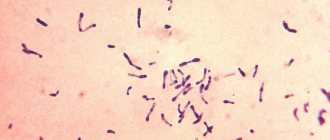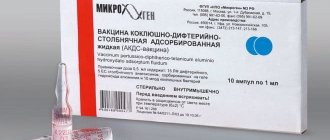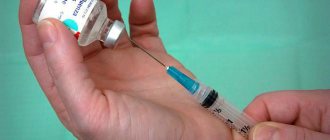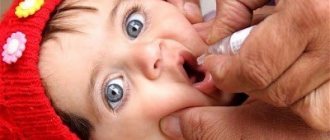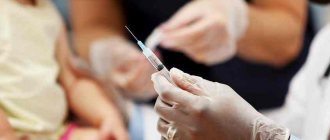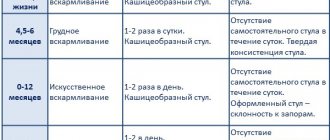What is the DPT vaccine for?
DTP vaccination is an adsorbed pertussis-diphtheria-tetanus vaccine. All three diseases that it protects against are caused by bacteria that produce toxins and attack the human body. Vaccination cannot protect against bacterial infection - it is aimed at neutralizing toxins.
Vaccine composition
The DPT vaccine contains components of three bacteria: Bordetella pertussis (causes whooping cough), Corynebacterium diphtheriae and Clostridium tetani (causes diphtheria and tetanus, respectively).
The pertussis component of the vaccine is represented by whole microbial cells, previously “killed” by formaldehyde. To protect against diphtheria and tetanus, the vaccine includes separate purified diphtheria and tetanus toxoids, which are obtained from the bacteria that cause these diseases. Thus, DTP is an inactivated vaccine. It may not provide as much protection as live, attenuated vaccines such as the measles vaccine, so it must be given multiple times.
Aluminum salts are added to DPT as an immune response enhancer (adjuvant). Antigens adsorbed on them provoke the development of humoral immunity.
Many people are afraid of the DPT vaccine because of its high reactogenicity. This is due to its pertussis component – whole cells of Bordetella pertussis. If for some reason your child cannot receive DPT, vaccination against diphtheria and tetanus can still be done. For this purpose, there are separate preparations of toxoids: AS - tetanus toxoid, AD - diphtheria toxoid and ADS - diphtheria and tetanus toxoids without pertussis component. Of course, ADS vaccination is more convenient, because then you will have to give fewer injections when receiving subsequent doses.
Goals of revaccination
In order for the body to develop lasting immunity against dangerous diseases, it is necessary to carry out several treatment and preventive procedures. People react differently to the same vaccine. There are cases when the body itself forms immunity for five to ten years. In most situations, one DPT vaccination does not give a good result, for this reason repeated vaccination is required. The immunity provided by the vaccine is long-lasting, but not lifelong.
Thanks to DPT revaccination, the body strengthens the formed antibodies against serious diseases. Immunization is more than just vaccination. The term refers to a number of measures aimed at maintaining the body's defenses. If a patient misses a revaccination, the likelihood of contracting the disease increases several times. Tetanus, diphtheria and whooping cough pose a threat to the lives of elderly patients, since their immunity is weakened.
Popular What dosages of suprastin should be given to newborns
Vaccination schedule
DTP vaccination is included in the National Preventive Vaccination Calendar. The vaccination course consists of three vaccinations:
- at 3 months,
- at 4.5 months,
- at 6 months.
Then at 18 months, revaccination is carried out. If the schedule was violated, the doctor waits 12–13 months after the last DPT vaccination. If the DPT vaccine was not administered at all, the age of the child matters:
- if the child is under 3 years 11 months 29 days, DPT is administered;
- if older, but not yet 6 years old, the pertussis component is excluded and ADS toxoid is administered;
- for children over 6 years of age, ADS-M toxoid is used, in which the content of diphtheria toxoid is reduced.
Important! According to the vaccination schedule, children at 6-7 and 14 years of age must undergo a second and third revaccination against diphtheria and tetanus using toxoid preparations with a reduced content of the diphtheria component (ADS-M). In the future, revaccination against these diseases is carried out for all adults once every 10 years.
Revaccination of older children and adults against whooping cough is not carried out in Russia, although vaccination with acellular whooping cough vaccines is widely practiced abroad in children and adolescents, as well as pregnant women, starting from the 26th week of pregnancy, which helps protect infants under 3 months from the disease (for vaccination of older children age and adults use special preparations with a reduced content of diphtheria toxoid).
ADSM vaccination
The ADS-M vaccine is used for the treatment and prevention of dangerous infectious pathologies. Vaccinations are divided into two types: emergency and planned. The first ones are prescribed to people who can easily get diphtheria or tetanus. Most people do not have developed immunity to these pathologies; it must be constantly maintained. ADS-M provides reliable immune protection. If vaccinated according to the schedule, it will prevent a dangerous pathology for several years.
ADS-M contains antibodies that promote the formation of immunity. The vaccine is used to prevent diphtheria and tetanus. Experts have not yet created other effective methods that would help prevent such pathologies. The danger of diphtheria is that it affects the respiratory tract. Pathology leads to swelling of the larynx. Diphtheria is transmitted by airborne droplets. In severe cases of pathology, the patient's kidneys and heart are affected.
ADS-M vaccination is necessary for adults and children. It provides prevention of a serious infectious disease - tetanus. When the virus enters the human body, it begins to multiply and produce toxoid. This substance affects nerve cells. A person infected with tetanus experiences seizures. In severe cases, the disease is fatal. Vaccination with ADSM is the only way to prevent serious diseases.
Description and application of serum
ADS-M does not contain as many antigens as other sera. The drug contains neutralized diphtheria and tetanus toxoids. ADS-M also contains aluminum hydroxide, formaldehyde and other auxiliary components. For children, the vaccine is administered intramuscularly into the thigh area, for adolescents - subcutaneously into the shoulder blade. A single dosage is 0.5 mm.
Before using the vaccine, you need to inspect the ampoule and packaging. The whey should not contain suspensions or other third-party particles. If the drug has sediment, you should stop using it. If the ADS-M vaccine has been stored for a long time, it turns white-yellow and a sediment appears at the bottom. It is prohibited to use a drug that has expired. The ADS-M vaccine, like its analogues, is not intended for freezing.
Vaccination schedule for adults
Vaccination is routine. The doctor informs you about it in advance. DPT revaccination is carried out after 10 years. The next vaccination is prescribed at the age of 26 years. The last immunization is given at age 75. If there are emergency indications, the doctor prescribes vaccination at 76 years of age.
What else you need to know about ADS-M
Before vaccinating, the doctor identifies contraindications. If the patient has at least one, the procedure is canceled. Before administering the drug, the doctor measures the temperature and assesses the general condition of the patient. If necessary, he will conduct a blood test.
After receiving the ADSM vaccination, you can take a bath, but you should not rub the area where the vaccine was administered. It is prohibited to swim in ponds or public pools. You are not allowed to use the sauna. It is not recommended to introduce new foods into your diet during the week. They can cause an allergic reaction, which the doctor will consider as a side effect of the vaccine. For 4 days you need to limit contacts. It is better not to visit guests and not invite anyone home. ADSM is incompatible with alcoholic beverages.
Alcohol weakens the effect of medications intended to strengthen the immune system. Vaccination is stressful for the body, and alcoholic drinks put a strain on the gastrointestinal tract, including the liver. Alcohol should be avoided over the next week.
The child has an undeveloped immune system; adults tolerate the DTP vaccine better. Vaccination does not cause any hassle and rarely leads to side effects, but everyone’s body is different. Some patients have a fever on the first day.
Popular Should I be afraid of a tuberculin test in a child?
This reaction is rare in adults and may be due to illness rather than the vaccine. If the temperature remains above 37, you should take Paracetamol. If the drug does not help, you need to consult a doctor. An anti-inflammatory medication may be prescribed. An adult may experience weakness and malaise. To improve your well-being, you need to rest, drink tonic tea or herbal medicine.
Some patients experience a lump with a diameter of 2.5 cm. This reaction is normal. If the lump lasts for 5 days and causes pain, you should consult a doctor. The ADSM vaccination can cause allergies and hives appear on the skin. Severe complications include angioedema and anaphylactic shock.
If such complications occur, antishock therapy is carried out. Side effects from the medicine should be checked with your doctor. After ADSM, blood pressure may increase. Some patients lose their appetite and become weak. If you notice such side effects, you should consult a doctor.
ADS-M has contraindications:
- pregnancy;
- infectious pathology in the acute stage;
- hypersensitivity to active substances.
If the doctor identifies at least one contraindication, the administration of the serum is canceled.
Preparing a child for vaccination
Before vaccination, children are always examined by a pediatrician.
Photo: AllaSerebrina / Depositphotos The vaccine is administered intramuscularly; the procedure does not require any special preparation. However, DPT has contraindications. Some are worth paying attention to, others only create false impressions about the vaccine.
True contraindications include:
- allergy to vaccine components, which manifests itself in a strong general reaction or complications after the previous administration. These include: the first two days, temperature above 40 ℃, swelling more than 8 cm in diameter, developed Guillain-Barré syndrome (autoimmune disease);
- severe immunodeficiency;
- convulsions/fits and other diseases of the nervous system in a progressive process.
What conditions cannot be exempt from vaccination?
False contraindications to DTP vaccination:
- acute diseases (4 weeks after recovery), mild respiratory diseases (2 weeks after);
- chronic diseases (the main thing is to wait for remission);
- diathesis (beyond exacerbation);
- weight loss, prematurity;
- allergic diseases: local rashes, spasm of the respiratory tract with cough (bronchospasm);
- taking antibiotics;
- convulsions/allergic reactions to DTP in relatives.
What else you should know
For premature babies, the doctor prescribes a delay in vaccinations. Its duration is individual and depends on the state of the body. The doctor recommends vaccination for preschoolers. To carry out the procedure, one of the popular drugs is used. Most vaccines do not cause severe side effects.
If necessary, the doctor replaces DTP with ADSM. The drug contains fewer antigens. If the child’s immunity is weakened, the doctor recommends a vaccine that does not contain the pertussis component (this substance leads to adverse reactions). Patients often wonder whether DPT revaccination can be postponed somewhat If a person is sick, he should wait until he recovers and only then carry out the procedure. If you have an allergic reaction to the vaccine, your doctor will prescribe another drug.
Contraindications to the vaccine:
- pathologies of the nervous system;
- hypersensitivity to the active substances of the vaccine or its auxiliary components;
- increased body temperature;
- afebrile seizures.
A contraindication to vaccination is also malaise caused by an exacerbation of the disease.
DTP analogues
Due to the frequency and severity of side effects associated with DTP, new, acellular drugs (ACDs) became widespread in the mid-1990s. All of them, like DPT, are combined with diphtheria and tetanus toxoids, but instead of whole pertussis bacteria they contain only individual pertussis antigens. Such vaccines are better tolerated and have completely replaced the DPT vaccine in many countries with a low risk of whooping cough infection. Many of the new cell-free drugs protect against 5 or even 6 infections at once:
- Infanrix hexa (6 infections, including hepatitis B, polio and Haemophilus influenzae),
- Pentaxim (5 infections, including polio and hemophilus influenzae),
- Tetraxim (4 infections, including polio).
Among the three-component BCVs: Infanrix for children and Adasel for adults (this vaccine has a reduced amount of diphtheria toxoid).
However, experts believe that the whole-cell vaccine protects better - there are more antigens, and the immune response is closer to natural infection. If we compare acellular vaccines, those with more pertussis antigens protect better.
When choosing between whole-cell drugs, in addition to DPT, you can pay attention to four-component ones, which also protect against hepatitis B.
Which vaccine is better to choose?
Both domestic and foreign vaccine preparations against whooping cough are presented on the Russian market.
Photo: TTK TV channel In Russia, people are vaccinated with whole-cell DPT produced by the Federal State Unitary Enterprise NPO Microgen of the Russian Ministry of Health. Foreign acellular vaccines are also available:
- Belgian "Infanrix"
- French "Tetraxim" from SANOFI PASTEUR,
- French "Pentaxim" from SANOFI PASTEUR.
The Russian inactivated combined vaccine “Bubo-Kok” produced by CJSC NPK “Combiotech” also protects against hepatitis B. The first Russian 5-valent vaccine “aDTaP-HepB+Hib” or pentovaccine produced by FSUE “NPO Microgen” is already available. It protects against five common childhood infections: diphtheria, whooping cough, tetanus, hepatitis B and Haemophilus influenzae.
Pertussis vaccine for adults
Until recently, there were no pertussis vaccines for adults in Russia.
However, in 2021, the drug “Adasel” produced by SANOFI PASTEUR appeared on the domestic market (Fig. 1). This is an acellular vaccine with a reduced content of diphtheria component. The US Centers for Disease Control and Prevention (CDC) recommends giving Adasel to adults as a booster dose to re-prime the body's immune response. The drug can also be administered to children, but again for revaccination, and not as a first dose. Pregnancy is not a contraindication for vaccination. The CDC offers pregnant women the same acellular Adasel. It is introduced at the beginning of the third trimester. In Russia, such vaccination is not practiced, although studies indicate there is no evidence of a risk to pregnancy. In America, this drug is administered before each pregnancy, even if there is a year or two between them. Children in the first months of life are susceptible to whooping cough; if the mother has not been vaccinated, they are defenseless against infection.
Figure 1. Adasel vaccine. Source: NSW Health
What to do after vaccination
It is important to monitor the condition of the body after vaccination. Their parents do this for their children. Mild side effects are more likely a good sign that the body has begun to work on its immune response. It is necessary to spend at least half an hour near the vaccination room in case of unexpected severe reactions.
The main thing is not to panic when normal passing reactions appear. You can ask your doctor in advance about antipyretic and antihistamine medications for children. On the 3rd day after vaccination, the appearance of any reactions is uncharacteristic.
DTP vaccination leads in the frequency of post-vaccination complications requiring hospitalization
More than half of all adverse events in the post-vaccination period occur due to DTP vaccination. At the same time, in the structure of AEFI (adverse events after immunization), the main share is made up of local reactions. Such data were obtained by the Children's Research and Clinical Center for Infectious Diseases of the Federal Medical and Biological Agency of Russia, summarizing the experience of 1,624 cases of hospitalization of children with diseases in the post-vaccination period.
The results of the study were presented by the former director of the Children's Scientific and Clinical Center for Infectious Diseases (DSCIB FMBA), now the honorary president of the center, academician of the Russian Academy of Sciences Yuri Lobzin at the plenary session of the XI All-Russian annual congress “Infectious diseases in children: diagnosis, treatment and prevention” on October 12.
“Fortunately, these side effects are not so many. And second: in the post-vaccination period, diseases that have no connection with vaccination predominate, and in the structure of side effects, the main share is made up of local reactions. Thus, the devil is not as scary as he is painted,” the scientist clarified. The study summarizes 15 years of work with patients, he noted.
It was found that out of 1624 hospitalized patients in the post-vaccination period, more than half (890 cases) were hospitalizations of children after vaccination with DTP (adsorbed pertussis-diphtheria-tetanus vaccine). Of these, 192 cases were post-vaccination normal reactions and complications. The remaining 698 are other infections and pathologies.
In second place in terms of the frequency of adverse reactions are anti-diphtheria and anti-tetanus vaccines - ADS and ADS-M (197 cases of hospitalization), of which 53 were associated with an adverse reaction. In third place was the anti-measles vaccine - 193 cases of hospitalization, of which direct reactions and complications after vaccination 49. Next in descending order are OPV (poliomyelitis vaccine) - 168 cases of hospitalization, of which are associated with normal reactions and complications 4 and CCP (combined vaccine against three infections: measles, rubella, mumps) - 63 cases of hospitalization, of which are associated with complications after vaccination 5.
According to data cited last year by the director of the Central Research Institute of Epidemiology of Rospotrebnadzor, Academician of the Russian Academy of Sciences Vasily Akimkin , in 2021, 256 cases of post-vaccination complications were officially registered. According to him, it is difficult to talk about what the causes of complications could be, but their proportion is extremely small “compared to the achievements that we see in the field of reducing the incidence rate and regulating epidemic processes.”
Earlier, the Chairman of the Executive Committee of the Union of Pediatricians of Russia, Academician of the Russian Academy of Sciences Leila Namazova-Baranova, asked doctors to more carefully check the accuracy of information about adverse events, primarily when interpreting to patients. According to her, it is difficult to justify colleagues who convey information incorrectly. At the same time, she clarified that information about post-vaccination complications should be open provided that there is a proven cause-and-effect relationship between the disease and the vaccine, since “there are too many myths” around vaccination.
What not to do after DTP vaccination
It is better not to engage in physical activity, because an enemy has entered the body, albeit inactivated. The body’s task is to develop cells that will resist this enemy. Therefore, in the first few days you should ensure yourself peace. However, if the child feels well, then walking is not contraindicated.
It is also not recommended to change the diet of a child or a nursing mother. This can lead to additional stress on the intestines, and therefore on the entire body.
Complications after vaccine administration
DTP vaccination can cause prolonged crying in children.
Photo by Laura Garcia: Pexels Complications after vaccination that require seeking medical attention include:
- allergic rash (not local),
- more than 3 hours of uncontrollable screaming and crying,
- swelling of the face and throat,
- labored breathing,
- cardiopalmus,
- dizziness, nausea and weakness.
In the 1970s, the use of whole-cell DTP vaccine was associated with encephalopathy in children. However, numerous studies have proven the absence of this connection.
